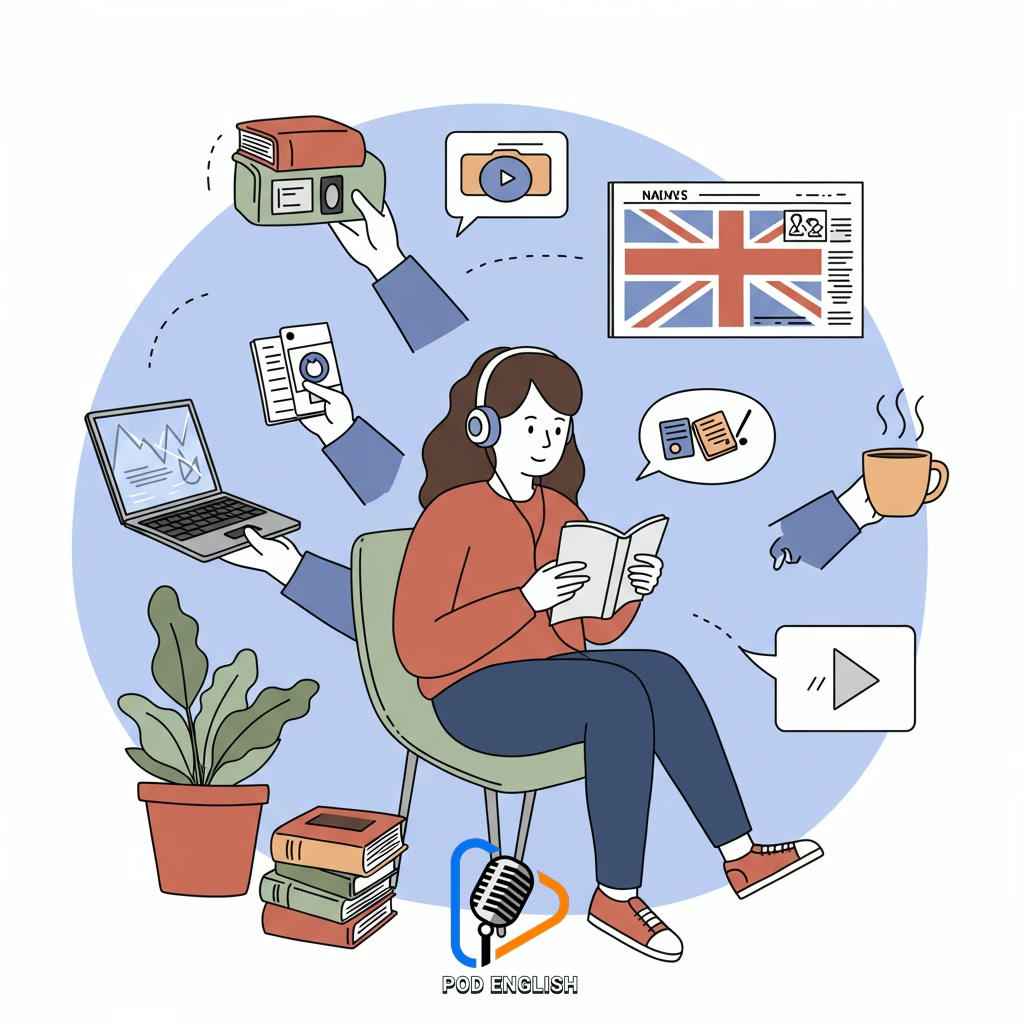Learn English
Learn English Effectively: How to Build a Sustainable Routine That Lasts

This content focuses on how to master English effectively by establishing a consistent and lasting study habit. It explores strategies for creating a routine that fits into your lifestyle, ensuring long-term progress and fluency. The aim is to guide individuals in developing disciplined practices for continuous English language acquisition.
Table of Contents
- Section 1: Understanding the Challenge: Why English Learning Routines Fail
- Section 2: Laying the Foundation: Setting Clear Goals and Finding Motivation
- Section 3: Designing Your Routine: Key Components for Effective Learning
- Section 4: Making it Sustainable: Incorporating Habits and Flexibility
- Section 5: Tracking Progress and Staying Accountable
- Section 6: Adapting and Evolving Your English Learning Journey
Section 1: Understanding the Challenge: Why English Learning Routines Fail
Many English language learners struggle to maintain a consistent study routine, leading to stalled progress and frustration. A primary reason routines fail is setting unrealistic goals or trying to do too much too soon. Overwhelm quickly sets in when facing hours of intense study daily, which isn’t sustainable alongside work, school, or other commitments. Lack of flexibility is another pitfall; rigid schedules can’t adapt to life’s unexpected events, causing learners to fall behind and feel discouraged. Additionally, routines often become monotonous if they lack variety, making it difficult to stay motivated. Without clear structure, measurable goals, and strategies for handling setbacks, even the best intentions can crumble, highlighting the need to understand these common challenges before building a lasting habit.

Understanding the Challenge: Why English Learning Routines Fail
Section 2: Laying the Foundation: Setting Clear Goals and Finding Motivation
To build a sustainable English learning routine, the crucial first step is laying a strong foundation by setting clear, achievable goals. Unlike vague aspirations, well-defined goals provide direction and a benchmark for progress. Think about what you want to achieve and by when – perhaps holding a basic conversation in three months, or understanding a specific level of podcast. Equally vital is identifying your motivation. Why do you want to learn English? Connecting your learning to personal interests, career ambitions, or travel dreams can fuel your drive, especially when faced with challenges. Understanding your ‘why’ helps you stay committed and reminds you of the value in your efforts, making the routine feel less like a chore and more like a purposeful journey.

Laying the Foundation: Setting Clear Goals and Finding Motivation
Section 3: Designing Your Routine: Key Components for Effective Learning
Following setting clear goals, the next crucial step is to design the routine itself by identifying and structuring the essential components that will fill your study time effectively. An effective routine isn’t merely about allocating hours; it’s about purposefully arranging activities that target different aspects of language learning. Key components typically involve dedicating specific time slots to various skills, such as listening comprehension, reading practice, speaking exercises, and writing tasks. Integrating diverse resources – including textbooks, language learning apps, podcasts, videos, and interaction with native speakers – is vital to keep learning dynamic and address different learning styles and needs. Consistency is paramount, so schedule your learning sessions for times you can reliably commit to, even if they are brief. Remember to include periodic review sessions to consolidate knowledge and monitor progress against your established goals.

Designing Your Routine: Key Components for Effective Learning
Section 4: Making it Sustainable: Incorporating Habits and Flexibility
To ensure your English learning routine isn’t just a temporary burst of enthusiasm but a lasting practice, the key lies in making it sustainable. This involves consciously building learning into your daily habits, treating it like something as automatic as brushing your teeth. Look for small, consistent pockets of time you can dedicate regularly. Equally important is building in flexibility. Life happens, and sometimes you’ll miss a session. Instead of getting discouraged, have a plan for how to adjust, whether it’s shortening the next session or rescheduling. This adaptability prevents minor setbacks from derailing your entire effort and keeps motivation high over the long haul, turning your routine into a resilient habit.

Making it Sustainable: Incorporating Habits and Flexibility
Section 5: Tracking Progress and Staying Accountable
Building a sustainable English learning routine is only part of the equation; equally crucial is tracking your progress and staying accountable. Tracking helps you see how far you’ve come, which is a powerful motivator, and reveals areas where you might need more focus. Simple methods like keeping a learning journal, using language learning apps with progress dashboards, or even recording yourself speaking can provide tangible evidence of improvement. Staying accountable ensures you stick to your routine even when motivation dips. This could involve finding a study partner to practice with regularly, sharing your goals with friends or family, or using calendar reminders and habit-tracking apps. By actively monitoring your journey and having systems or people to keep you on track, you transform your routine from a hopeful plan into a consistent, results-driven practice, making long-term fluency a realistic goal.
Tracking Progress and Staying Accountable
Section 6: Adapting and Evolving Your English Learning Journey
Building a sustainable English learning routine is only part of the equation; equally crucial is tracking your progress and staying accountable. Tracking helps you see how far you’ve come, which is a powerful motivator. However, a truly effective routine is one that adapts and evolves with you. As you advance, your challenges change, your goals might shift, and new resources become available. Regularly review your current methods: are they still challenging? Are you focusing on the right skills? Don’t be afraid to adjust your schedule, try different learning techniques, or explore new topics. Flexibility is key to preventing burnout and ensuring your learning remains relevant and engaging over the long haul. Embrace the idea that your learning journey is dynamic and requires periodic adjustments to stay on track and continue making meaningful progress.

Adapting and Evolving Your English Learning Journey













